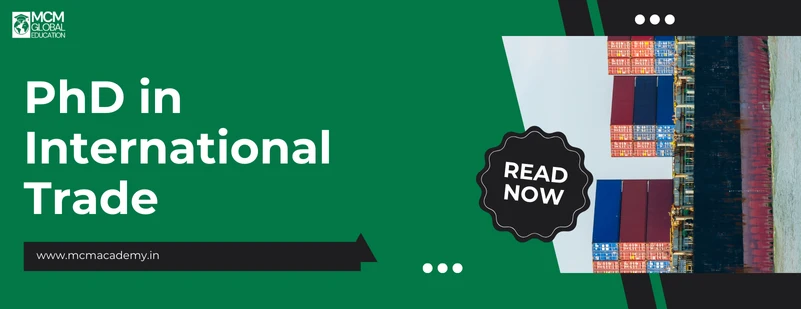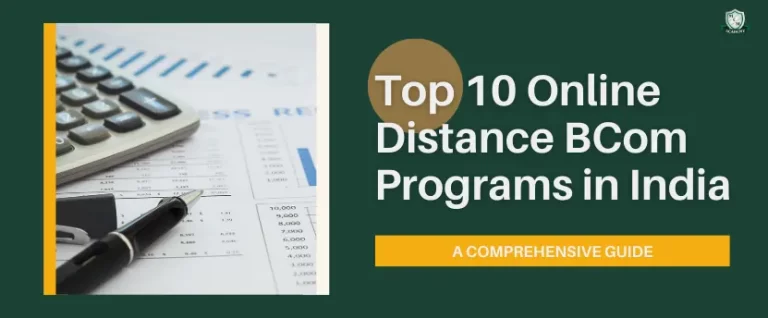A PhD in International Trade is one of the most prestigious academic programs designed for students and professionals who want to specialize in global trade policies, international economics, cross-border commerce, and trade law. In today’s interconnected economy, international trade is the lifeline of global growth, with countries increasingly dependent on imports, exports, free trade agreements, and global supply chains.
By pursuing a PhD in International Trade, you gain advanced research expertise, academic recognition, and the skills to influence trade negotiations, economic policymaking, international business strategies, and global development.
This blog provides a comprehensive guide to PhD in International Trade, including eligibility, syllabus, top universities, research areas, career prospects, and salary packages worldwide.
Table of Contents
What is a PhD in International Trade?
A PhD in International Trade is a research-focused doctoral program that prepares scholars to analyze and shape international commerce. The program combines international economics, trade law, global finance, and policy analysis, with an emphasis on original research and dissertation writing.
Graduates of this program often pursue careers in academia, global organizations (WTO, IMF, UN), government policy, multinational corporations, and consulting firms.
| Aspect | Details |
|---|---|
| Degree Type | Doctor of Philosophy (PhD) |
| Duration | 3–6 Years |
| Specialization | International Trade, Economics, Business, Trade Law |
| Focus Areas | Global trade policies, tariffs, FDI, international supply chains |
| Career Paths | Academic, Policy-making, Research, Consultancy, Trade Analyst |
Eligibility Criteria for PhD in International Trade
Eligibility requirements vary by country and institution, but the general criteria include:
| Criteria | Details |
|---|---|
| Educational Qualification | Master’s degree in International Trade, Economics, Business, Management, Law, or related fields |
| Minimum Marks | 55%–60% (or equivalent GPA) |
| Entrance Exams | GRE, GMAT, or university-specific entrance exams |
| English Proficiency | IELTS/TOEFL required for international students |
| Research Proposal | A well-structured proposal outlining intended research |
| Work Experience | Preferred but not mandatory (in trade/business sectors) |
PhD in International Trade Syllabus
The syllabus of a PhD in International Trade blends theoretical learning, research methodology, and dissertation writing.
| Year | Subjects Covered |
|---|---|
| Year 1 | Advanced International Economics, Trade Theories, Research Methodology |
| Year 2 | Global Business Environment, Trade Law, Quantitative & Qualitative Research |
| Year 3 | International Finance, WTO & Trade Policies, Foreign Direct Investment |
| Year 4–6 | Electives + Dissertation + Thesis Defense |
Specializations Available:
- International Economics & Finance
- Trade Law & Policy
- Global Supply Chain & Logistics
- Emerging Markets & Trade Development
- Foreign Direct Investment (FDI) Studies
Top Universities for PhD in International Trade
Global Universities
| University | Country | Duration |
|---|---|---|
| Harvard University | USA | 5–6 Years |
| London School of Economics (LSE) | UK | 4–5 Years |
| University of Cambridge | UK | 4–6 Years |
| University of Melbourne | Australia | 4–5 Years |
| National University of Singapore (NUS) | Singapore | 4–5 Years |
Top Indian Universities
| University | Location | Duration |
|---|---|---|
| Jawaharlal Nehru University (JNU) | New Delhi | 4–6 Years |
| Indian Institute of Foreign Trade (IIFT) | New Delhi/Kolkata | 4–5 Years |
| Delhi School of Economics | Delhi | 4–5 Years |
| Indian Institutes of Management (IIMs) | Multiple | 4–6 Years |
| Symbiosis International University | Pune | 4–5 Years |
PhD in International Trade: Research Areas & Topics
Choosing the right research topic is critical for success. Some trending research areas include:
- Impact of Trade Agreements (WTO, NAFTA, RCEP) on Global Economy
- Role of Technology in International Trade (Digital Trade, E-Commerce, AI in Supply Chains)
- Trade Wars and Their Impact on Emerging Economies
- Foreign Direct Investment and Economic Development
- Sustainable Trade Practices and Green Economy
- Tariffs, Quotas, and Protectionism in Global Trade
- Globalization and its Effect on Small Economies
- Cross-Border Taxation and International Business Law
Career Scope After PhD in International Trade
Graduates with a PhD in International Trade enjoy diverse career opportunities:
Academia
- Professor / Research Scholar in Trade & Economics
- University Lecturer in International Business
- Researcher at Global Institutions
Corporate Sector
- International Business Consultant
- Trade Compliance Officer
- Global Supply Chain Strategist
Government & Policy Making
- Trade Policy Analyst
- Economist at Government Departments
- Advisor in Ministry of Commerce / Finance
International Organizations
- WTO, IMF, World Bank, UNCTAD, OECD
- Global Economic Think Tanks
- Trade Development NGOs
Salary After PhD in International Trade
Salary varies across roles, experience, and country of employment.
| Role | Average Salary (India) | Average Salary (US/UK) |
|---|---|---|
| Assistant Professor | ₹8–12 LPA | $70,000–$100,000 |
| Trade Policy Analyst | ₹12–20 LPA | $90,000–$120,000 |
| International Business Consultant | ₹15–25 LPA | $100,000–$140,000 |
| Economist (Govt./Think Tank) | ₹10–18 LPA | $80,000–$120,000 |
| Corporate Strategy Head | ₹25–40 LPA | $130,000–$180,000 |
Skills Required for PhD in International Trade
To succeed in this program, candidates must have:
- Analytical & Research Skills – to assess trade data and economic policies
- Strong Mathematical & Statistical Knowledge – essential for quantitative research
- Understanding of Trade Laws – WTO rules, tariffs, international regulations
- Problem-Solving Abilities – for real-world trade challenges
- Communication Skills – to present research findings effectively
- Global Perspective – ability to think beyond borders
Advantages of Pursuing a PhD in International Trade
- High Academic Prestige – respected worldwide
- Influence on Policy – contribute to global trade agreements
- Career Diversity – academia, consulting, policymaking, corporate leadership
- Global Exposure – international research opportunities
- Financial Rewards – higher long-term salary growth
Challenges of PhD in International Trade
While rewarding, this degree comes with challenges:
- Time Commitment – 4–6 years of rigorous research
- Financial Costs – high tuition in top global universities
- Research Pressure – need to publish in reputed journals
- Competitive Academic Market – limited teaching positions globally
- Work-Life Balance – long dissertation writing phases
PhD in International Trade vs MBA in International Business
| Parameter | PhD in International Trade | MBA in International Business |
|---|---|---|
| Focus | Research & Policy | Management & Application |
| Duration | 4–6 Years | 2 Years |
| Career Path | Academia, Policy, Research, Consulting | Corporate Management, Global Business Roles |
| Eligibility | Master’s + Research Proposal | Bachelor’s + Entrance Exam |
| Average Salary | Higher in long run | Higher initially |
Future of PhD in International Trade
The future of PhD in International Trade looks promising, with trends like:
- Digital Trade Growth – expansion of e-commerce and fintech
- Sustainable & Ethical Trade – emphasis on green economy
- Global Supply Chain Resilience – research on post-pandemic trade disruptions
- AI & Big Data in Trade Analytics – revolutionizing trade research
- Emerging Economies – India, China, Brazil shaping global trade policies
Scholars with a PhD in International Trade will be at the forefront of shaping future trade policies, global commerce strategies, and sustainable development goals (SDGs).
Conclusion
A PhD in International Trade is ideal for those who wish to combine academic research with global policy-making and international business expertise. It provides prestige, career opportunities, and the ability to influence global trade policies at the highest levels.
Whether you aspire to become a professor, trade policy advisor, economist, or global consultant, this doctorate opens doors to both academic and corporate leadership roles.
With the right research focus and skills, a PhD in International Trade equips you to shape the future of global commerce and international economic relations.























